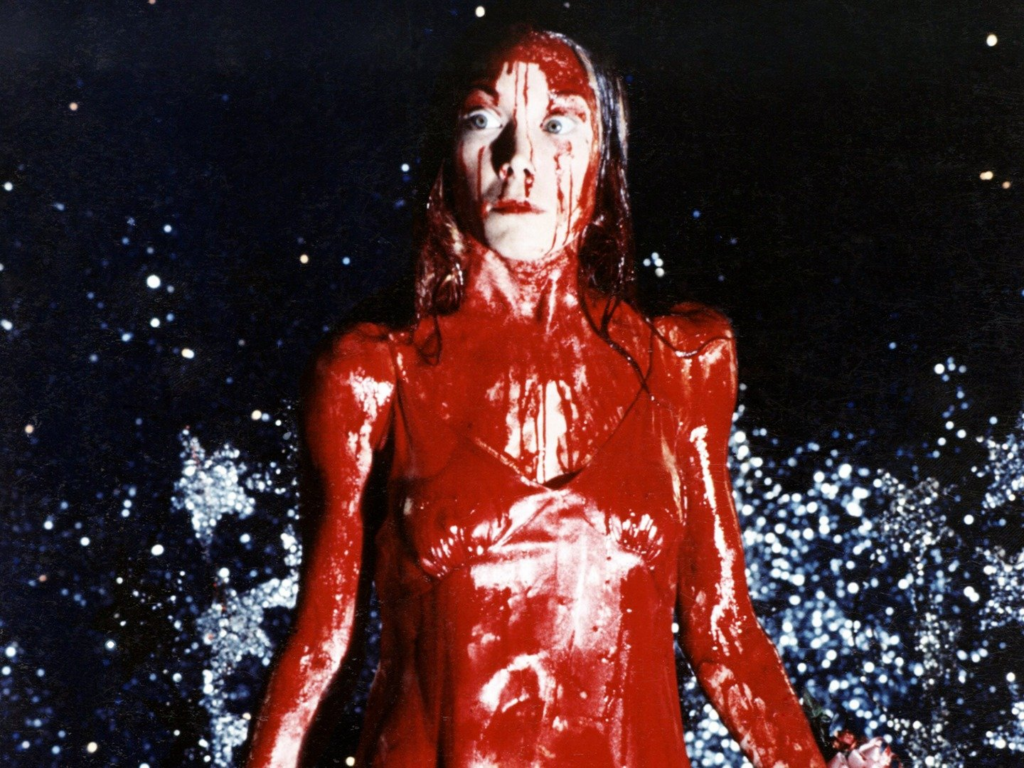
CARRIE (director: Brian De Palma; screenwriters: Lawrence D. Cohen/based on the novel by Stephen King; cinematographer: Mario Tosi; editor: Paul Hirsch; music: Pino Donaggio; cast: Sissy Spacek (Carrie White), Piper Laurie (Margaret White), Nancy Allen (Chris Hargensen), William Katt (Tommy Ross), Amy Irving (Sue Snell), John Travolta (Billy Nolan), P.J. Soles (Norma Watson), Betty Buckley (Miss Collins), Sidney Lassick (Mr Fromm), Priscilla Pointer (Mrs. Eleanor Snell), Stefan Gierasch (Mr. Henry Morton), Michael Talbott (Freddy DeLois); Runtime: 98; MPAA Rating: R; producer: Paul Monash; MGM; 1978)
“The first big hit directed by Brian De Palma.”
Reviewed by Dennis Schwartz
A classic offbeat horror movie based on Stephen King’s first novel that was adapted to the screen by Lawrence D. Cohen. It was the first big hit directed by Brian De Palma (“Greetings”/”The Wedding Party”/”Hi Mom”). Anyone who had a difficult time in high school relating to bullies can relate to the problems experienced by the film’s harassed heroine. It plays out as a revenge film that becomes excessive in its act of retaliation, as the mocked and seemingly helpless heroine in the conclusion literally brings the house down on her tormentors through her telekinetic powers. Though the misfit heroine is sympathetically portrayed and in a surprisingly realistic way, the film itself veers into exploitation territory whereby it never gets by as anything much more than a well-crafted, humorous and well-acted sicko shocker.
Carrie White (Sissy Spacek) is the loner Bates high school senior (think Psycho!) who dwells with her abandoned fanatical evangelical mother (Piper Laurie), whose husband ran off a long time ago with another woman. The ugly-duckling, insecure and unworldly girl is kept as an outcast under a tight watch by her loony self-righteous Bible-quoting mom, who makes her pray in the closet and hangs on the dining room wall a picture of “The Last Supper.” At school Carrie is cruelly made fun of by the other girls for her sad-sack appearance, and is laughed at and taunted by all the girls when she has her period in the locker room and doesn’t know what’s happening to her because mom thinks sex is a sin and therefore never told her daughter about the “facts of life” (calling it “the curse of blood,” through which women brought sin into the world). Only the gym teacher Miss Collins (Betty Buckley) responds to Carrie in a kindly manner and offers her a warm hug.
When the gym teacher punishes a group of girls most responsible for taunting Carrie with a week’s detention, one of the girls, Chris (Nancy Allen), manipulates her dumb greaser boyfriend Billy (John Travolta) into slaughtering a pig for its blood to be used in an awful prank against Carrie during the prom. The other girl tormentor, Sue Snell (Amy Irving), is guilt-ridden over the incident and while having a change of heart tries to apologize for her foul behavior by getting her popular, blond curly-haired, football hunk boyfriend, Tommy Ross (William Katt), to date Carrie for the prom. It’s interesting to note that both girls use sex to influence their pawn-like boyfriends to do what they want (Chris with a blow job, Sue by ignoring Tommy till he honors her request). At the dance, Chris maneuvers to rig the ballots with her friends to get Carrie and Tommy elected as prom king and queen. When receiving the honor onstage Billy dumps a pail of pig’s blood on Carrie. Carrie’s secret fear of being laughed at looms true as she catches in the crowd Chris’ best friend Norma (P.J. Soles) laughing and trying to get her shocked boyfriend to laugh. She falsely believes everyone is laughing at her even though that’s not true, and as a knee-jerk reaction unleashes her pent up anger and her telekinetic power on everyone in the gym. The fire hoses get unleashed, the building catches fire and then collapses, killing everyone but Sue. Since Sue was acting suspiciously at the dance, she was ushered out of the gym by an alert Miss Collins and became the lone survivor (but who will nevertheless be mentally scarred). Chris and Billy who fled laughing before the gym collapsed soon get their cosmic comeuppance when Chris tries to run Carrie down in Billy’s pickup and instead Carrie causes it to swerve off the road and turn over in flames killing the evil couple. At home, Carrie is attacked by her man-hating mother with a knife, in her warped mind thinking she’s making a blood sacrifice to God. The attack is repelled when Carrie is able to turn the kitchen knives against mom and kills her crucifixion style. Feeling cursed, Carrie prays in her closet and the house goes up in flames and is pulled down on her. That being not enough shocks for De Palma, he employs one more final shock at the film’s conclusion. It was a gimmick shot that worked for this film, but when used in other De Palma films was seen merely as a cliché because if it was expected it became ineffective as a shocker. It was known adversely as the “Carrie Syndrome.”
The film leaves you in a disturbed and uncertain mood, as the stylish filmmaker uses a bunch of film school tricks to emotionally manipulate the viewer. The surprise is the effective over-the-top performance by Spacek, who moves us by her plight and makes us feel her pain. Laurie’s overacting was also effective for the film, but was so one-dimensional that it hardly could be called a moving performance—more like a manic one.
REVIEWED ON 2/10/2008 GRADE: B
Dennis Schwartz: “Ozus’ World Movie Reviews”
© ALL RIGHTS RESERVED DENNIS SCHWARTZ